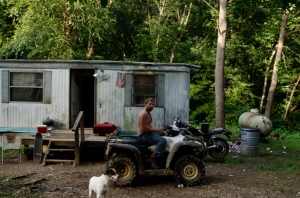The Ted Nugent Paradox
Let’s do a quick thought experiment. Imagine two communities of people. They have a lot in common. They both live in areas where access to resources is severely limited (they might have to drive 45 minutes or more to get to a decent grocery store). They both have the choice to either send their kids to bad schools or really bad schools. They are both made up primarily of people who have limited education; a high school diploma at best. They could both optimistically be called “working class” but more realistically called “working poor”. Their communities have been ravaged by disinvestment and outsourcing. As a result, even for those with an education, anything resembling a middle class job is hard to come by. Nihilism is the default worldview in both communities and, not coincidentally, drug addiction and drug related crime is exploding. In both of these communities, a parent’s greatest hope is that their child will move away. Often, this hope is so strong, and the ways out so limited, that they strongly encourage their child to join the armed forces, knowing full well the chance that he could get blown up by an IED halfway across the world in some politician’s pointless Hollywood war. By any objective measure, you would say that both of these communities are “oppressed” by the “system” (this being the terminology du jour among liberal thinkers). Another way to say it would be “screwed” by “rich people”.
Now let’s consider the differences between these two groups: One is overwhelmingly white, the other overwhelmingly Black and Latino. One is rural, the other is urban. That’s about it.
Well that’s not it it. There are significant cultural differences (although not as vast as some may think, as we will see shortly), and more importantly, there is a HUGE difference in the way they are perceived and treated by a third group of people: suburban liberals, most of whom are white, and most of whom are middle to upper class. These suburban liberals have a hell of a lot of power in society, especially in the media. I’ve lived my entire life in one or the other of these communities, and I feel more connected to them than simply a neighbor. They are my closest friends and my family. And it drives me nuts to see them pitted against each other by people that clearly don’t understand them.
Liberal Classism
A core tenet of 2015 liberalism is the idea that “the system” is to blame for all of the worst “isms” in the world, particularly racism and sexism. “The System” is decried as evil, as something to be dismantled and railed against. I agree. There is a system put in place by the rich and powerful to maintain the status quo, which they obviously benefit from. I’m not going to get into theory behind this, but I’m with the liberals on it. However, there’s another “ism” that the system perpetuates, and its an “ism” that suburban liberals not only contribute to, but contribute to gleefully while patting themselves on the back. They even get congratulated and rewarded for their contributions to it by other suburban liberals. This “ism”; classism, is almost exclusively directed at the rural working class and working poor; i.e. rednecks, hillbillies, white trash. I.e. my friends and family. Maybe one day we’ll take classism as seriously as we take racism and sexism, but that day’s a long way off.
White liberal classism, from what I’ve seen, exists overtly in two forms. The first, and more subtle, is the “What’s the Matter With Kansas?” form, where wealthy white liberals moan and gnash their teeth over rural working class whites supporting causes that *gasp* not liberal. The chief concern is that these rednecks are voting against their self interest. The term “brainwashed” gets thrown around a lot here, as if that’s the only explanation for why rural folks wouldn’t vote for Democrats. Even assuming that the suburban liberals have an honest concern for the well being of the rednecks (which is a stretch), this attitude is incredibly condescending and patronizing. First of all, the assumption that rural areas are exclusively conservative strongholds is objectively false. There are broad swaths of this country, many of them right here in Michigan (especially the UP), where Democrats are consistently elected in rural areas. Even the areas represented by Republicans are more often than not swing districts. Take for example my hometown. Yes it is represented by a radical conservative in the state legislature, but he won by only 190 votes over a weak Democratic opponent. To say it is a purely conservative area is to dismiss the 49.9% of voters who chose the Democrat. Second of all, this attitude assumes that because people are poor, they have less of a right to care about social issues, issues like gun control or abortion. It’s OK to disagree with rural people on the issues, but please don’t treat us like we somehow have less of a right to our opinions because of our class.
The Nugent Paradox
The second, more insidious, offensive form that white liberal classism takes is what I call “The Ted Nugent Paradox.” In this instance, “problematic” behavior by poor rural whites is decried, called out, and mocked, when similar behavior by minorities in inner cities would be explained as a “product of the system”. Now I want to be clear here: I’m a Democrat, I’m in most ways a liberal, and I think that the liberals are right too blame systematic oppression for the (rare, non-representative) problematic behavior of inner city minorities. I simply think the same paradigm should be applied to oppressed rural whites.
The Nugent Paradox gets its name from a phenomenon I’ve noticed recently that goes like this. Most white liberals my age, including me, are fans of rap music. Our fandom is not seen as “problematic” but as a sign of our tolerance and open mindedness. No one would ever ask me to account for the “problematic” lyrics of, say, Ice Cube (a rap godfather, with titles such as “A Bitch is a Bitch” in his catalog). No one would ever assume that the lyrics or philosophy of my favorite rappers represented my worldview. On the other hand, when I tell people I’m a fan of Ted Nugent’s music, there seems to be an unspoken assumption that I’m being ironic (I’m not). If I wasn’t being ironic, then I would have to explain away his sexism, racism, anti-environmentalism, etc. The courtesy I get extended for my rap fandom isn’t replicated for redneck music like Ted Nugent, Kid Rock, or Merle Haggard.
We don’t have to look far for other examples of the Nugent Paradox. Inner city riots are (rightly) explained by pointing to systematic oppression through police brutality, joblessness, poor education etc. On the other hand, some impoverished shmuck in the swamps of Alabama with a confederate flag in his garage is (and I quote directly) “THE problem with America”. Never mind the systematic policies that have pitted his people against minorities for what little crumbs are left from the table, or the poor education he got in rural public schools (just as bad as inner city schools in most instances). Never mind the fact that no one even sees that flag off the two track he lives on. Hell, never mind the fact that while we’re debating this the banks are pillaging our economy again, and cops are killing unarmed kids, black, brown, and white again. Nope just look over there, at that piece of white trash. HE’s the problem. When it comes to poor white folks we never look at the system. We just mock them and distance ourselves. “At least we’re not racist like him”.
The Redneck Buffer
So why does this happen? Why are we so slow to realize the systematic oppression of rural people? Why is it somehow OK, even for the most progressive people, to make fun of someone for being poor, as long as he or she is white?
Here’s why: the rednecks are the buffer. They’re the buffer the rich use to protect themselves from inner city rage. As long as oppressed minorities stay angry at poor whites, their anger can’t be directed at Wall Street and the Waltons, who are the deserving recipients of it, who’ve screwed up America for all of us; black, brown, and redneck (and who are probably plenty satisfied to keep redirecting the anger toward rednecks in perpetuity). They’re the buffer for upper and middle class whites, even the liberal ones, to point at and say “they’re the problem”. In gawking at the rednecks missteps and misadventures, his general political incorrectness, the suburban liberal is able to avoid a long hard look in the mirror, one that just might end with an acknowledgment of all the ways his upper class suburban lifestyle contributes to “the system”, and to all the isms. We keep directing all the blame onto the white working class, and then ask “why are they so angry?”.
The Psychological Toll
So what happens when rural america gets the blame for everything, and it continues unchecked for generations? Well for one thing, the real problems don’t get solved. Blaming rednecks isn’t going to fix our broken economy or keep cops from killing innocent people. But it also has an effect on the psychology of rural people, particularly young ones.
A few weeks ago I was in my hometown for the fourth of July. I went out on a buddy’s pontoon boat and drank some beers with a bunch of old friends from High School. At some point the conversation rolled around to a few mutual friends who had recently moved to Chicago. One of them had moved there with no job prospects, just up and left. When my friend Josh mentioned this, we sat in silence for a couple seconds until another friend spoke up: “Well, good for him though, getting out of here and going somewhere”. We all nodded in agreement.
That’s how bad our internalized guilt is, how subconscious our shame. We’ve blamed everything on rural America for so long, that kids from my generation are ashamed to even admit where they come from. It’s so bad that kids are seen as somehow moral for simply leaving, even without a job lined up. They’re congratulated just for going somewhere (the opposite of which, obvious but unspoken, is “nowhere”). And as for those left behind, they have to live with a vague sense of shame about their hometown, a place that is unique and beautiful and in my opinion 100 times more interesting than Chicago. And right now there’s a whole generation of people embarrassed that they even live there.

